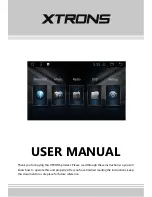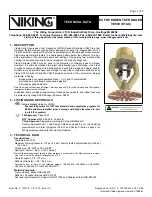
3
4 -
Refit jumper SW1.
Programming receivers
1 -
Remove jumper SW2 from any
entry panel.
2 -
Lift the handset of the receiver
to be programmed (for telephone
sets, see the instructions featured
in interface IT/300).
3 -
Press the door-lock release and
auxiliary 2 buttons at the same time
for at least 1 s (when audio towards
the entry panel is enabled, the
operation is confirmed).
4 -
On the entry panel, press the
call button the receiver is to be
associated with.
5 -
Replace the handset.
6 -
Repeat the operation from point
2 on for all remaining receivers.
7 -
Refit jumper SW2 to exit pro-
gramming.
WARNING. The programming
procedure for the VSE/300 selec-
tor, where fitted, must only be
performed once you have pro-
grammed which calls from the
entry panels are to be associated
with which receivers.
In installations with XA/300LR
we recommend you gather up
the receiver’s ID (SN) codes,
applied on the outside of the
housing, and enter them in the
tables that come with the
XA/300LR, MPP/300LR and
IPC/300LR.
NOTE. Once the power supplier
has been programmed using a
PCS/300 or MPP/300LR unit, it will
no longer be possible to gain
access to the entry panel stan-
dard programming.
To restore default conditions,
please refer to the related chapter.
Return to default conditions
from entry panel
1 -
Remove the SW1 jumper.
2 -
Close the earthed door open
contact.
A sound signal confirms that the
operation has occurred.
3 -
Replace the SW1 jumper.
Technical features
• Power supply:
12÷16 V AC
14÷18 V DC.
• Current demand:
- on standby with 14 V DC max.
120 mA;
- operating with 14 V DC max. 150
mA;
- with door-lock release activated,
add 500 mA;
- for each HEP/306 VR, add 35
mA;
- for each VZS/308C, add 15 mA;
- for 64 receivers, add 64 mA.
• Secrecy of speech.
• Door-lock release command:
pulse-type for solenoid lock at 12
V 1 A.
• Timed solenoid door-lock release:
adjustable in the range 1 to 15 s.
• Installation activation time: 60 s.
• Call duration time: 30 s.
• Bus output: power supply at 15 V
DC for booster and receivers.
- three potentiometers for the fol-
lowing functions (fig. 3-4):
volume control at entry panel;
volume control at receiver;
P1
timed (in the range 1 to 15 s)
solenoid door-lock release.
The entry panel comes with system
busy and door-lock release buzzer.
The wires supplied make it simple
to connect the entry panel’s
various component units.
Function of each terminal
12÷16 V AC 14÷18 V DC
power supply
solenoid lock output
door-lock release button
–
earth for solenoid lock
auxiliary command 1 out-
put
auxiliary command 2 out-
put
B IN
bus input from other entry
panels
B OUT
bus output towards recei-
vers or other entry panels
Connector functions
5-pin CN1 connector:
used for con-
nection to VZS/308C in the entry
panel HEP/306 VR.
3-pin CN3 connector:
used for con-
nection to buttons of HEC/302÷304
VR entry panel.
1-red:
to button n° 2.
2-orange:
to button n° 3.
3-yellow:
to button n° 4.
WARNING. In installations with a
number of entry panels, call but-
tons must be arranged in the same
order on each.
Connector CN4:
comes ready con-
nected.
1-black:
to button no. 1.
2-brown:
to button no. 1.
3-green:
to LEDs lighting the but-
tons.
4-yellow:
to LEDs lighting the but-
tons.
WARNING. Wires belonging to
cables that are not used must be
insulated.
Function of jumpers SW1 and
SW2 (fig. 4)
SW1
:automatic programming of
number of entry panels (default
setting 1).
SW2
:programming of receivers.
PROGRAMMING
Programming of number of entry
panels
(only required where there
is more than one entry panel)
1 -
Start with the last entry panel
connected in series to the bus
(usually the one with terminals
B IN
not connected).
2 -
Remove jumper SW1.
3 -
Wait for the note confirming the
operation (approximately 3÷15 s).
The number of confirmation signals
also indicates the number of pre-
sent and programmed entry
panels (1 signal for the main entry
panel and 1 signal for each secon-
dary entry panel).
• Aux 1 command output: 3.5 V
DC at 1 mA (available only with
entry panel enabled, activation
time same as timed solenoid
door-lock release).
• Aux 2 command output: 3.5 V DC
at 1 mA (always available in all
entry panels, activation time same
as timed solenoid door-lock relea-
se).
• Entry panel activation output: 3.5
V DC at 1 mA (enabled for entire
duration of conversation).
• Working temperature range: -15
°C to +50 °C.
Installation instructions
The embedding box must be fitted
flush with the wall at an appropria-
te height.
Fit the spacer into embedding boxes
to avoid deformation (fig. 1A).
WARNING. Connecting cables
must be fed through one of the
knockout cable entry points, loca-
ted at the bottom of the embedding
box (C in fig. 1).
The name card can be removed
and filled in with the relevant infor-
mation by removing the card clip
followed by the actual card it self
(fig. 2).
NOTE.
Personalized name cards
can be used up to a maximum of 2
mm thick.
Secure the chassis to the front plate
using the two screws supplied (fig.
3).
In order to fit the front plate on the
embedding box, screw on the two
fastening screws using the screw-
driver supplied (fig. 5).
DISPOSAL
Do not litter the environment with
packing material: make sure it is
disposed of according to the regu-
lations in force in the country where
the product is used.
When the equipment reaches the
end of its life cycle, take measures
to ensure it is not discarded in the
environment.
The equipment must be disposed
of in compliance with the regula-
tions in force, recycling its compo-
nent parts wherever possible.
Components that qualify as recy-
clable waste feature the relevant
symbol and the material’s abbre-
viation.
D
INSTALLATIONS-
ANLEITUNG
AUSSENSTATION FÜR
HAUSSPRECHANLAGEN
HEC/301÷304 VR
Die Außenstation für Haussprech-
anlagen ermöglicht die komplette
Anlagensteuerung.
Durch die Kombination mit den
Ruftastentableaus HEP/306 VR
können Anlagen mit bis zu maxi-
mal 64 Stromabnehmern geschaf-
fen werden.
Die Außenstation benutzt für den
Anschluss der Innensprechstellen
den Bus BPT
X2 TECHNOLOGY
,
der in einer einzigen verdrillten
Telefon-schleife alle für den
Anlagenbetrieb erforderlichen
Signale überträgt.
Über die Serienschaltung an die
erste Außenstation ist das Hinzu-
fügen drei weiterer Außenstationen
sowohl für Videosprech- als auch
Haussprechanlagen ohne die
Benutzung weiterer Geräte (Wähl-
schalter, Verteiler) möglich.
Die Außenstation ist folgenderwei-
se ausgestattet:
- Lautsprecher- und Mikrofonsatz;
- LED mit Infrarotlicht für die
Beleuchtung des Subjekts;
- drei Spannungsteiler für die fol-
genden Funktionen (Abb. 3-4):
Regelung der Lautstärke an der
Außenstation;
Regelung der Lautstärke an der
Innensprechstelle;
P1
Regelung (von 1 bis 15 s) der
Aktivierungsdauer des Elektrosch-
losses.
Die Außenstation ist mit einem
Tonsignal, der den Besetztzustand
der Anlage meldet, und mit einem
aktiven Elektroschloss ausgestat-
tet.
Die mitgelieferten Kabel sorgen für
einen leichten Anschluss an die
verschiedenen Geräte der Außen-
station.
Funktion der Klemmleisten
12÷16 V AC 14÷18 V DC
Stromversorgung
Ausgang Elektroschloss
Türöffnertaste
–
Masse für Elektroschloss
Ausgang Zusatzsteuerung 1
Ausgang Zusatzsteuerung 2
B IN
Buseingang von anderen
Außenstationen
B OUT
Busausgang zu den
Innensprechstellen oder
anderen Außenstationen
Funktion der Steckverbinder
Steckverbinder CN1 mit 5 Schalt-
stellungen:
für den Anschluss zu
VZS/308C an das Tableau
HEP/306 VR.
Steckverbinder CN3 mit 3 Schalt-
stellungen:
für den Anschluss zur
Ruftatsten der Außenstation
HEC/302÷304 VR.
1-rot:
an die Taste Nr.2.
2-orange:
an die Taste Nr.3.
3-gelb:
an die Taste Nr.4.
ACHTUNG. In Anlagen mit mehre-
ren Außenstationen ist die
Beibehaltung derselben Ruftasten-
anordnung erforderlich.
Steckverbinder CN4:
schon ange-
schlossen.
1-schwarz:
zur Ruftaste Nr.1.
2-braun:
zur Ruftaste Nr.1.
3-grün:
zu den LED Tastenbeleu-
chtung.
4-gelb:
zu den LED Tastenbeleuch-
tung.
ACHTUNG. Unbenutzte Kabel-
leiter isolieren.


































